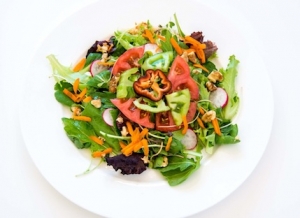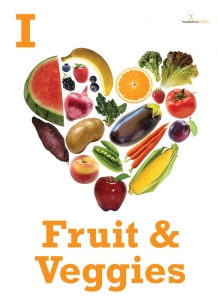5 Tips for a Healthful Vegetarian Lifestyle
Remember that post about vegetarian diets and weight management? Research Update: Vegetarian Diets and Weight covered the results of a study linking vegetarian diets to successful weight loss.We loved hearing your thoughts on that story. One email in particular has really stuck with me, so I’d like to share it with you. Ponna Sambasivan, RDN, LD, wrote…
Interesting and I have concerns with the take home message -- people would assume just vegetarian foods will promote weight loss. But vegetarian diet can be prepared with fats, sugar and salt and defeat weight loss. I think it is important to look at the preparation aspect as well. My 2 cents!
Thanks Ponna
Ponna makes a good point. Building a healthful vegetarian diet is about so much more than making sure that meat isn’t on the plate. That’s why I’d like to take a closer look at ways to make sure that a vegetarian eating plan is balanced and nutritious.Here are 5 tips for building a healthy vegetarian diet…Tip #1: Skip Saturated Fat. Saturated fat is mostly found in animal products, but that doesn’t just mean meat. Full-fat milks, yogurts, and cheeses are also loaded with saturated fat. Steer clear of saturated fat by choosing low-fat or fat-free versions of these foods. After all, the Centers for Disease Control and Prevention remind us, “Diets high in saturated fat have been linked to chronic disease, specifically, coronary heart disease. The Dietary Guidelines for Americans 2010 recommend consuming less than 10% of daily calories as saturated fat.”Tip #2: Choose Fiber-Rich Foods. Fruits, vegetables, and whole grains are all loaded with fiber. Make them a key part of your balanced vegetarian diet and you'll reap health benefits galore.Which health benefits?Well, according to the paper, Health Benefits of Dietary Fiber, “Individuals with high intakes of dietary fiber appear to be at significantly lower risk for developing coronary heart disease, stroke, hypertension, diabetes, obesity, and certain gastrointestinal diseases. Increasing fiber intake lowers blood pressure and serum cholesterol levels. Increased intake of soluble fiber improves glycemia and insulin sensitivity in non-diabetic and diabetic individuals. Fiber supplementation in obese individuals significantly enhances weight loss."Tip #3: Steer Clear of Tropical Oils.Tropical oils like coconut oil and palm kernel oil are actually loaded with saturated fat.The authors of the study Tropical Oils: Nutritional and Scientific Issues, maintain ”Health professionals express concern that consumers who choose foods containing tropical oils unknowingly increase their intake of saturated fatty acids. The saturated fatty acid-rich tropical oils, coconut oil, hydrogenated coconut oil, and palm kernel oil, raise cholesterol levels.”Check the ingredient lists of your favorite packaged foods and choose the options without tropical oils. You can also replace tropical oils in your own cooking by using olive oil or canola oil instead.Tip #4: Reduce Sodium. As you might remember, the Dietary Guidelines for Americans have quite a bit to say about sodium in eating patterns, vegetarian or not.The key assertion is for people to “Reduce daily sodium intake to less than 2,300 milligrams (mg) and further reduce intake to 1,500 mg among persons who are 51 and older and those of any age who are African American or have hypertension, diabetes, or chronic kidney disease.”To reduce your sodium intake, check out versions of packaged, canned, and frozen foods and choose the options with low sodium. Eating plenty of fresh fruits and vegetables will also displace sodium-rich foods from your diet.Tip #5: Look for Nutrients. Choose nutrient-rich foods in order to get the highest number of benefits per calorie.Steer clear of empty calories from foods that are loaded down with solid fats and added sugars — these calories fill you up without offering any nutrients or health benefits. Plus, they can displace foods that are higher in vitamins and minerals.Choosing lots of fresh fruits and vegetables, whole grains, lean protein, and low-fat dairy foods will help you get the nutrients you need to stay healthy.You can share these tips with your clients by linking to this post or downloading the free PDF handout that my team created just for you.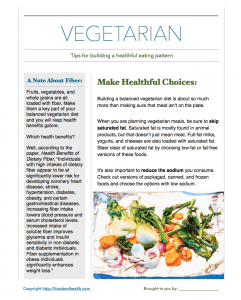 There’s a lot more to know about building a vegetarian diet, so be sure to check out the members-only guide to vegetarian eating.
There’s a lot more to know about building a vegetarian diet, so be sure to check out the members-only guide to vegetarian eating.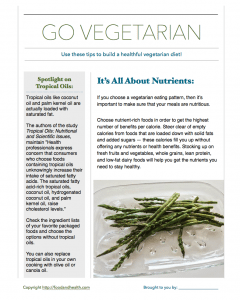 It’s got another handout with more health tips and a yet another handout with a great vegetarian recipe.
It’s got another handout with more health tips and a yet another handout with a great vegetarian recipe.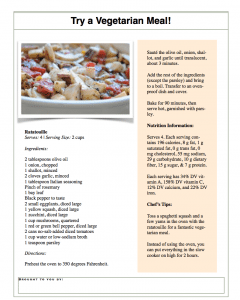 We're here to help you look your very best, right now! For more great vegetarian resources, drop by the Nutrition Education Store...
We're here to help you look your very best, right now! For more great vegetarian resources, drop by the Nutrition Education Store...